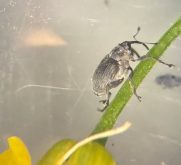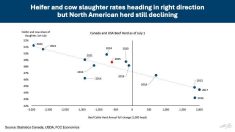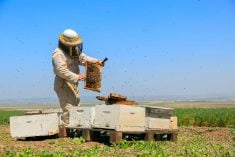Canadian beekeepers are calling on the federal government to re-examine the risks that have blocked U.S. packaged bees from Canada since the 1980s.
Honeybee health decline and bee mortality took the stage at an April 26 meeting of the House of Commons Standing Committee on Agriculture and Agri-Food. Representatives from the honey sector presented on the production issues faced by their industry, as well as the federal policies they would like to see.
Why it matters: The debate over U.S. boxed bees heated up after beekeepers had high bee losses in 2022 and encountered supply issues related to imported stock during the pandemic.
Read Also

Tie vote derails canola tariff compensation resolution at MCGA
Manitoba Canola Growers Association members were split on whether to push Ottawa for compensation for losses due to Chinese tariffs.
The last risk assessment by the Canadian Food Inspection Agency, done in 2013, indicated a significant risk from U.S. bee imports via Africanized genetics, resistant American foulbrood, varroa mites and small hive beetles. Several witnesses said new regulations are needed to reflect current beekeeper realities.
Jeremy Olthof, past-president of the Alberta Beekeepers Commission, recommended that the border be reopened to U.S. bee imports, specifically from northern California.
Alberta beekeeper Ron Greidanus said current border measures are ineffective against pests such as varroa mite because the insects could easily enter Canada on their own.
“It is a fallacy to think that the 500-mile border we share with the United States is a wall or a force field,” Greidanus said.
Current regulations allow queens to be imported from Hawaii and California, but not packaged bees. A 2022 report from Agriculture and Agri-Food Canada lists only Australia, New Zealand and Chile as sources of packaged honeybee imports since 2017.
Greidanus said the risks could be mitigated if Canada worked jointly with the U.S. to develop a North American bee strategy. Resistant American foulbrood and resistant varroa both exist in Canada already, he added, and small hive beetle and Africanized honeybees both fail to thrive in Canada’s climate.
The issue of access to U.S. bees has been frustrating and divisive in Manitoba.
Association president Ian Steppler said he sent a letter last year to Agriculture and Agri-Food Minister Marie-Claude Bibeau, asking for a new risk assessment but was disappointed by the response.
In a reply, the government said the risks were too significant, “without absolutely any explanation whatsoever,” Steppler said.
In his view, the system for boxed bee imports from northern California is ready because Canada already sources queens from the region and protocols are in place. Sellers are geared for a Canadian market, he said.
“We need more bees, is what we need. What beekeepers are asking for, whether it comes from the United States or whether it comes from Italy or New Zealand or Australia, they want availability, they want consistency and they want affordability.”
Steppler said the CFIA’s 2013 assessment made many of recommendations based on the uncertainty of pest risk but today’s situation may look very different.
“Instead of using unknowns to determine high risk, let’s use the science to determine whether or not the risk is legitimate or not.”
















